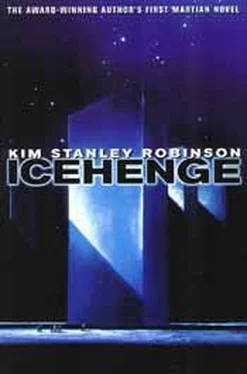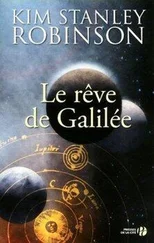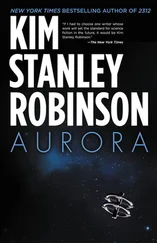How long could humans live in a spaceship?
How long would they have to?
One morning after a night like that there was a knock at my door, and I opened it. It was Davydov.
“Yes?” I said.
He ducked his head. “I’m sorry about the way I behaved during our talk. It’s been so long since I’ve gotten any criticism of the project, I’d forgotten how to react to it. I guess I lost my temper.” Head raised, a shy little smile — Forgive me? Forgive me for kidnapping you and then yelling at you to boot?
“Umm,” I said cautiously. “I see.”
The smile disappeared, he pulled at his swarthy cheeks with one hand. “Could I perhaps, um, take you on a tour of the starship? Show you what we plan to do?”
I stood thoughtfully for as long as I could, knowing that I would accept the offer, curious to see what they had managed to steal from the Committee. “I suppose,” I said.
I saw from the boat’s dome, during our crossing, that they had finished connecting the two ships, with thin struts that held them side by side, and contained narrow passageways. It was one fat and ungainly-looking starship. Its windows gleamed like the luminous patches of ocean-floor fish. We were still in a tiny cluster of asteroids. The big one, I had learned, was Hilda; and around it were several daughter rocks.
It took Davydov several hours to show me what they had. They had: ore-holds full of minerals, medical supplies, foodstuffs, spices, clothing, equipment for planetfall, color panels and other material for the seasonal changes; a microfiche library of forty million volumes in three hundred languages; an equally vast collection of recorded music, with several each of almost every musical instrument; sports equipment; a lot of movies in English and Russian; a nursery full of toys and games; a room full of computers and computer parts; an observatory with several large telescopes.
During this ever more amazing tour we kept up a running debate, mostly joking. It was actually very enjoyable, although I think the sparring began to bother Davydov after a while. But I couldn’t help it. Their efforts had been so thorough, but still, there was something adolescent about it all, something surreal: all the details logically worked out, from an initial proposition that was absurd.
We ended up in the farm, among the splotched algae bottles that made the light green, in the rich scent of manure from the barn next door. Davydov looked funny in sunglasses. Here I was the guide, and Davydov the tourist. I told him about Nadezhda’s algae suspension tricks, Marie-Anne’s mutant bacteria.
“I hear you have been helping them.”
By now it could be said I was in charge of the project. “A little,” I said sarcastically.
“I appreciate it.”
“Oh, don’t take it personally.”
He laughed wryly. But I saw that I could wound him.
And then we came to the back wall of the farm, and it had all been seen. Behind the wall the shield silently vibrated, protecting us all from the nuclear reactions in the rear of the ship. There was another part of their project that must hold without fail, and the arcane studies that enabled the shield technicians to do it were nearly beyond explanation to those of us who had not committed our lives to the mysteries. To us it was simply a matter of faith.
“But this is what I want to know,” I said at the wall. “Why do you have to do it this way? People will leave the solar system eventually, right? You don’t need to do it this way.”
He pulled at his face again. I remembered it was a gesture of Swann’s, and I thought, this is where Swann got it. “I don’t agree that it is inevitable that humans will leave the solar system,” he said. “Nothing is inevitable, there is no such thing as historical determinism. It is people who act, not history, and people choose their acts. We could have built a really adequate starship at any time since the late twentieth century, for instance. But it hasn’t been done. And it could be that those two hundred years are a sort of launch window, you know. A launch window that may close soon.”
“What do you mean?”
“That the chance may pass. Our ability to do it might disappear. There’s a revolution going on on Mars this very minute — Swann told you?”
“Yes.”
“So who knows? We may be escaping the end of civilization! Life on Mars could end, and that would damage Earth — they depend on that Mars colony for minerals, you know. And those Terran governments are just bigger versions of the Committee, doing just as bad a job. They’ve taken Earth into another of its crisis periods.”
“They’ve gotten through those before,” I said, worrying about Mars.
“That doesn’t mean much. They never had a population of six billion before. Even the trouble on Mars may be enough to push them over the brink! It’s a very delicate, artificial ecology, Emma. Much like this little starship of ours. And if it falls apart, then the chance to go to the stars is gone for a long time. Maybe forever. So we’re doing it ourselves, right here and now.”
“You have a vision—”
“Not just me!”
“I meant all of you.”
“Ah. Sorry. English should make that distinction.”
“Does Russian?”
“Not really.” We laughed.
The force of his ideas had impelled Davydov around the farm, and velcro rips had accompanied his words as he walked between the rows of vegetables. When he finished, I watched his dark face through the distorting glass of a spare algae bottle — his ice-blue eyes were the size of eggs, staring at me intently. I thought, He wants to convince me of these things. It matters to him what I think. This idea made me flush with pleasure, and it occurred to me that this was how he had become the leader of this visionary group. Not by any choice of the Mars Development Committee, looking for a scapegoat. He was the leader because he could make people feel this way.
The intercom system crackled. “Oleg?” It was John Dancer’s voice, sounding scared. “Oleg, are you hearing me? Respond quickly please.”
Davydov hurried to the wall with the intercom and flicked it on. “What is it, John?”
“Oleg! We need you on the bridge quick. Emergency.”
“What is it?”
“We’ve spotted three ships approaching through two-belt central. Looks like police craft.”
Davydov looked across at me. “I’ll be there right away,” he said. He ran between the vegetables to my side. “Looks like that trouble on Mars isn’t occupying all of them.” His voice was still light and joking, but his eyes were grim. “Come along.”
So I went with him, across to the bridge of Rust Eagle. There were about a dozen people there, a few attending to the Eagle, the rest to Davydov and Ilene Breton.
“They’re coming in an equilateral triangle pattern,” Ilene said. “Simon spotted them by visual check — after he had seen the one, he ran through the police patterns and found the other two. If they don’t make any adjustments, they’ll come by with one on each side of us and one below.”
“How long do we have?” Davydov asked.
“They’re decelerating now. They’ll pass this sub-group in about three hours.”
I have never seen such a grim collection of people in my life. Only the clicks and breath of the ship’s functions broke the silence that followed this announcement. I thought of it. Everything I had just seen, and the forty years of dangerous work it had taken to get it here, were now the prey of a diligent hunter. It could all end in four hours, in capture and imprisonment, return to Mars under guard, in the “starship.” Or it could end in sudden death. Those Committee ships carry quite the arsenals.
Читать дальше











